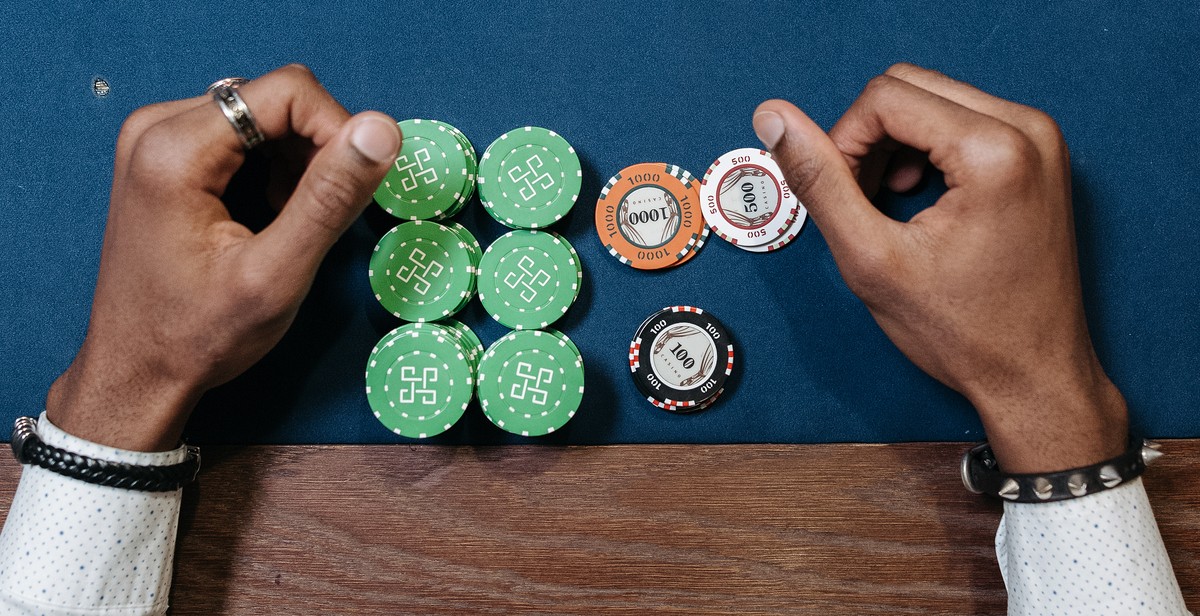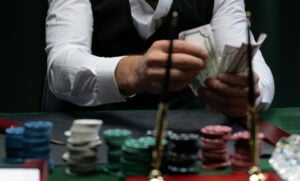The Psychology of Gambling: Understanding the Mental and Emotional Aspects of Casino Gaming
Gambling is a popular form of entertainment that has been around for centuries. From the early days of dice games to the modern slot machines, the allure of gambling has never waned. However, what drives people to gamble and what keeps them coming back for more? This is where the psychology of gambling comes into play.
At its core, gambling is a form of risk-taking behavior. It involves putting money or something of value on the line in the hopes of winning something more in return. But why do people take these risks? One theory is that gambling provides a sense of excitement and thrill that is hard to replicate in other activities. The anticipation of a win, even a small one, can release dopamine in the brain, which creates a pleasurable sensation.
But not all gamblers are chasing the thrill of a win. For some, gambling may serve as a form of escape from their everyday lives. The casino environment, with its bright lights and constant stimulation, can be a welcome distraction from stress and anxiety.
However, gambling can also have negative consequences for some individuals. It can lead to addiction, financial problems, and strained relationships. Understanding the psychology of gambling can help individuals make informed decisions about their gambling habits and seek help if necessary.
- In this article, we will delve deeper into the psychology of gambling and explore:
The Appeal of Gambling
Gambling has been a pastime enjoyed by people for centuries. The allure of the casino is often attributed to the thrill of risk-taking, the desire for control, escapism, and entertainment. These factors combine to create an experience that many find exhilarating.
The Thrill of Risk-Taking
One of the primary appeals of gambling is the thrill of risk-taking. The possibility of winning big or losing everything creates a rush of adrenaline that can be addictive. The uncertainty of the outcome keeps players on the edge of their seats, making every decision feel like a high-stakes gamble.
The excitement of gambling is not limited to the possibility of winning or losing money. The unpredictability of the games themselves can be just as thrilling. Whether it’s the roll of the dice or the spin of the roulette wheel, the anticipation of what will happen next is what keeps players coming back for more.
The Desire for Control
Another factor that draws people to gambling is the desire for control. In a world where so much is out of our hands, the ability to make decisions that directly impact the outcome of a game can be empowering.
Many casino games require skill and strategy, such as poker or blackjack. The ability to outsmart opponents and make calculated decisions can be a source of pride and accomplishment. For others, the control they seek is more psychological. The act of placing a bet can give a sense of control over their fate, even if the outcome is ultimately left to chance.
Escapism and Entertainment
For some, gambling is a form of escapism from the stresses of daily life. The casino environment, with its bright lights, sounds, and excitement, can provide a temporary escape from reality. It’s a chance to let loose and have fun without the pressures of work or personal responsibilities.
Furthermore, gambling can be a form of entertainment in and of itself. The social aspect of playing with friends or meeting new people at the casino can add to the overall experience. Many casinos offer a variety of games, shows, and amenities that can keep players entertained for hours on end.
- The thrill of risk-taking
- The desire for control
- Escapism and entertainment
Overall, the appeal of gambling is multifaceted. Whether it’s the thrill of risk-taking, the desire for control, or the need for escapism and entertainment, there is something for everyone at the casino. Understanding the psychological factors behind this attraction can help individuals make informed decisions about their own gambling habits.

The Dark Side of Gambling
While gambling can be a thrilling and enjoyable experience for some, there is a dark side to it that cannot be ignored. The following are some of the negative consequences that can arise from gambling:
Addiction and Dependency
One of the biggest dangers of gambling is the potential for addiction and dependency. This is especially true for those who struggle with impulse control or have a history of addiction. The thrill of winning can quickly turn into a compulsion to keep playing, even when it becomes financially or emotionally damaging.
According to the National Council on Problem Gambling, around 2 million adults in the United States are estimated to meet the criteria for pathological gambling, while another 4-6 million are considered problem gamblers. These individuals may experience a range of negative consequences, including financial problems, strained relationships, and mental health issues.
Financial and Legal Consequences
Another significant risk of gambling is the potential for financial and legal consequences. When individuals become addicted to gambling, they may prioritize it over other important expenses, such as rent, bills, or even food. This can lead to financial ruin and even bankruptcy.
In addition, gambling can lead to legal problems, particularly if individuals engage in illegal activities to fund their habit. For example, some people may turn to theft or fraud to obtain the money they need to keep gambling. This can result in criminal charges and a criminal record, which can have long-lasting consequences.
Mental Health Issues
Gambling can also take a toll on individuals’ mental health. For example, people who become addicted to gambling may experience anxiety, depression, and other mood disorders. They may also struggle with impulse control, which can lead to reckless behavior and poor decision making.
In some cases, gambling can also exacerbate preexisting mental health conditions. For example, individuals with bipolar disorder or schizophrenia may be more susceptible to developing a gambling addiction, and their symptoms may become more severe as a result.
It is essential to recognize the potential risks of gambling and take steps to mitigate them. This may include setting limits on gambling behavior, seeking help from a therapist or support group, or avoiding gambling altogether.

The Psychology of Winning and Losing
Winning and losing are two sides of the same coin in the world of gambling. The thrill of winning can be exhilarating and addictive, while the pain of losing can be devastating and demoralizing.
The High of Winning
Winning triggers the release of dopamine in the brain, a neurotransmitter that is associated with pleasure and reward. This rush of dopamine can create a euphoric feeling that is similar to the high experienced by drug users. The more a person wins, the more dopamine is released, leading to a desire for more and more wins.
As a result, winning can be addictive, and gamblers may continue to play even after they have won a significant amount of money. This desire to chase the high of winning can lead to reckless behavior and can cause gamblers to lose more money than they can afford.
The Pain of Losing
Losing can be a painful experience, both emotionally and financially. Losing triggers the release of cortisol in the brain, a hormone that is associated with stress and anxiety. This can lead to feelings of frustration, anger, and depression.
Additionally, losing can be financially devastating, especially for those who gamble beyond their means. The financial losses can lead to debt, bankruptcy, and even homelessness.
The Gambler’s Fallacy
The Gambler’s Fallacy is the belief that previous outcomes affect future outcomes. For example, if a person flips a coin and it lands on heads five times in a row, they may believe that the next flip is more likely to land on tails. In reality, each flip is an independent event and is not affected by previous outcomes.
This fallacy can lead to irrational behavior, such as increasing bets after a losing streak in the hopes of a big win. This behavior can be dangerous, as it can lead to significant financial losses.
- Winning triggers the release of dopamine in the brain, creating a euphoric feeling that can be addictive.
- Losing triggers the release of cortisol in the brain, leading to feelings of stress and anxiety.
- The Gambler’s Fallacy is the belief that previous outcomes affect future outcomes and can lead to irrational behavior.

The Role of Environment
The environment in which we gamble can have a significant impact on our behavior and decision-making. Casino design, social norms, and arousal are three key factors that can influence our gambling experiences.
The Impact of Casino Design
Casino design is carefully crafted to create a specific atmosphere and to encourage gambling behavior. The layout of the casino floor, the lighting, and the sounds all work together to create a stimulating and exciting environment.
For example, casinos often use bright, flashing lights and loud noises to create a sense of urgency and excitement. The layout of the casino floor is also designed to encourage players to keep gambling, with slot machines strategically placed to keep players engaged and moving around the casino.
The Influence of Social Norms
Social norms can also play a role in our gambling behavior. For example, if we perceive that gambling is a socially acceptable activity, we may be more likely to engage in it. On the other hand, if we believe that gambling is frowned upon or stigmatized, we may be less likely to gamble.
Additionally, social pressure from peers or family members can also influence our gambling behavior. If we are surrounded by people who gamble frequently, we may be more likely to do so as well.
The Effect of Arousal
Arousal, or the state of being alert and engaged, can also impact our gambling behavior. When we are in a state of arousal, our decision-making processes can be influenced, and we may be more likely to take risks and engage in impulsive behavior.
Casinos often use tactics to increase arousal, such as offering free drinks or playing fast-paced music. These tactics can make us feel more alert and engaged, which can lead to increased gambling behavior.
- Casino design, social norms, and arousal are all factors that can influence our gambling behavior.
- Casinos use tactics such as bright lights, loud noises, and free drinks to create a stimulating and exciting environment.
- Social norms and pressure from peers can also impact our gambling behavior.
- Arousal can make us more likely to engage in risky or impulsive behavior.
Conclusion
Understanding the psychology of gambling is crucial for anyone who wants to indulge in casino gaming. It is essential to know the mental and emotional aspects of gambling and how they can affect your behavior and decision-making process.
One of the most significant factors that influence gambling behavior is the dopamine rush that comes with winning. It can be addictive and lead to a cycle of chasing losses and risking more money than intended. Therefore, it is vital to set limits and stick to them when gambling.
Another critical aspect of gambling psychology is the belief in luck and superstition. It is essential to understand that luck is not a reliable factor in gambling and that outcomes are determined by chance and probability.
Moreover, it is crucial to recognize the signs of problem gambling and seek help if needed. Gambling addiction can have severe consequences on one’s life, including financial, social, and mental health issues.
Overall, understanding the psychology of gambling can help individuals make informed decisions and enjoy casino gaming responsibly. By setting limits, recognizing the role of chance, and seeking help when needed, individuals can avoid the negative effects of gambling and enjoy the entertainment it provides.



